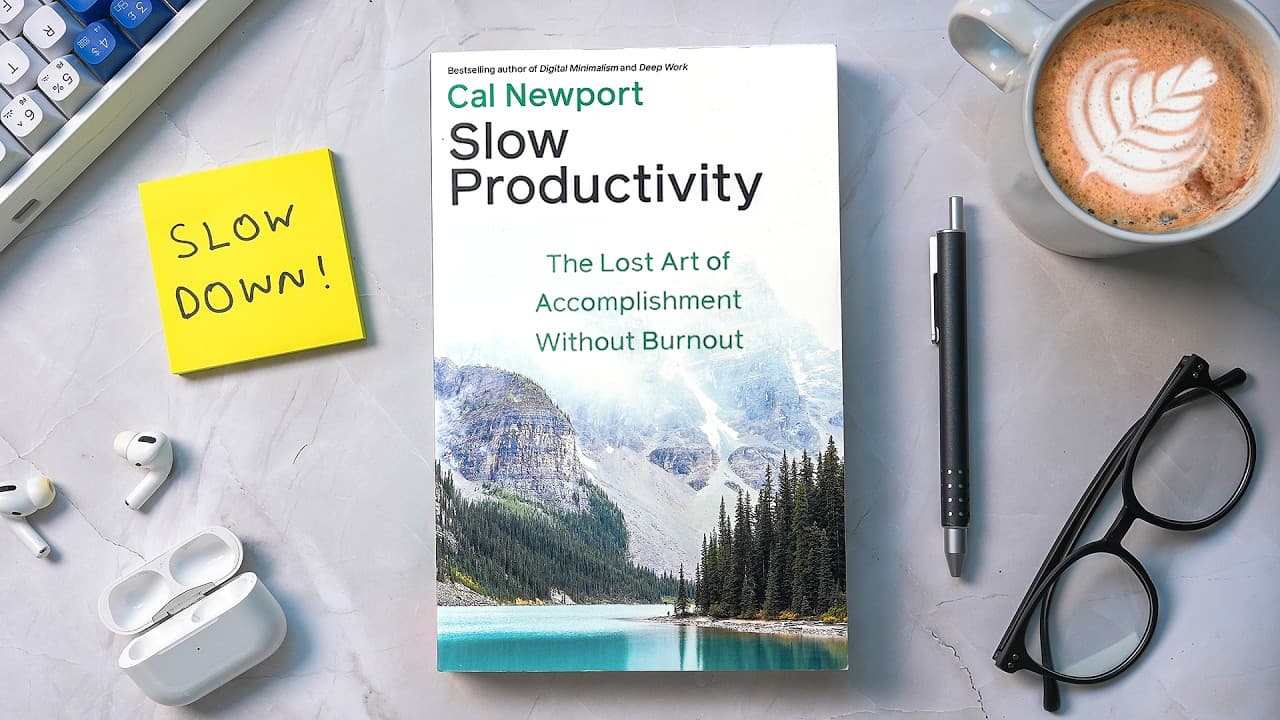How to Be More Productive (By Working Less)
25 Jun 2024 (over 1 year ago)

Why do we need Slow Productivity? (0s)
- Trying to do too many things can hinder progress towards goals.
- Energy is pulled in too many directions, leading to burnout.
- Cal Newport's book "Slow Productivity" offers a solution to this problem.
- Principle 1: Focus on a few important things.
- Avoid spreading energy across multiple tasks.
- Prioritize tasks that align with long-term goals.
- Principle 2: Work in short, intense bursts.
- Use the Pomodoro Technique: work for 25 minutes, then take a 5-minute break.
- Maintain focus during work periods.
- Principle 3: Take regular breaks.
- Breaks are essential for productivity.
- Take breaks throughout the day, especially after completing a task.
The Foundations of Slow Productivity (1m10s)
- Cal Newport argues that our current understanding of productivity is flawed.
- Traditional productivity measures, such as hours worked, are not always accurate indicators of actual productivity.
- This focus on activity has led to burnout and decreased job satisfaction.
- Newport proposes a "slow productivity" revolution, similar to the slow food and slow fashion movements.
- Principle 1: Deep Work
- Deep work is focused, uninterrupted work that produces high-quality results.
- It requires concentration and effort, and it is often done in short bursts.
- Principle 2: Rituals
- Rituals are routines that help you to get into a productive state of mind.
- They can include things like setting a specific time and place for work, or starting your day with a meditation session.
- Principle 3: Quitting
- Quitting is not about giving up, but rather about letting go of unproductive activities.
- It means saying no to distractions and focusing on the tasks that matter most.
Principle 1 (Do fewer things) (4m11s)
- Jane Austen's most notable works were produced during periods of significant free time, challenging the contemporary bias towards constant activity.
- The first principle of slow productivity involves reducing obligations and focusing on a few important projects to minimize overhead tax.
- Managing time effectively includes creating a visible list of active projects and prioritizing tasks, communicating with managers about workload capacity.
- Contrary to popular belief, good employees have more power than they realize, and bosses prioritize finding and retaining good workers.
- Brilliant offers a first principles approach to learning, emphasizing critical thinking through problem-solving, with new programming courses for Python.
Principle 2 (Work at a natural pace) (12m40s)
- Cal Newport's second principle of productivity is to work at a natural pace and avoid rushing important work, as the modern obsession with working long hours is not conducive to our most important work.
- Embrace seasonality by taking breaks and working at a slower pace during certain times of the year or week to allow ideas to simmer and work on projects over a sustainable timeline, which will produce better quality work.
- Shortform is a service that summarizes over a thousand non-fiction books and has an affiliate link with a 20% discount in the video description.
- Shortform also has a new podcast guides feature.
Principle 3 (Obsess over quality) (17m2s)
- Obsess over the quality of your work, aiming for "good enough" rather than perfect, even if it means missing short-term opportunities.
- Recognize that good things take time and focus, which may require saying no to other obligations.
- Balance short-term commercial opportunities with long-term focus on your craft.
- Consider the delicate balance between quality and productivity, as it varies depending on the industry and individual.
- The book mentioned in the video is highly recommended for those interested in productivity and will be read as one of the first selections in the speaker's community book club, "Productivity Lab."
- Another video about a complementary book, "The 12 Week Year," is suggested for a different perspective on productivity.